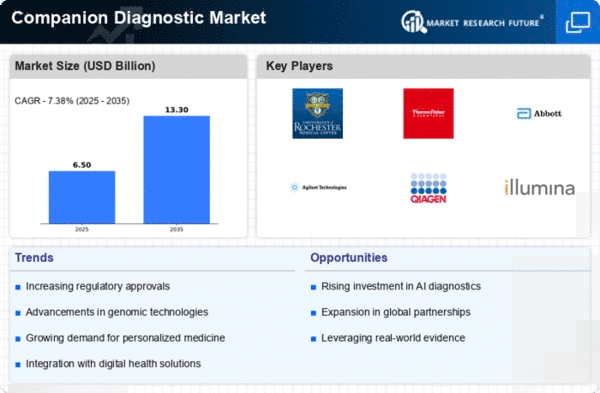Market Analysis
In-depth Analysis of Companion Diagnostic Market Industry Landscape
In the healthcare industry, companion diagnostics is constantly evolving. The market in question is strongly related to personalized medicine, which co-develops diagnostic tests and focused treatment approaches to improve patient outcomes. Technology, targeted medicines, and individualized patient care affect the companion diagnostics industry. Technological innovation drives companion diagnostics market dynamics. Molecular biology, genomics, and proteomics have made diagnostic tests more accurate and advanced. Genetic testing and other companion diagnostics can identify people who will benefit from a medication. This allows doctors to tailor treatments to individual patients. The companion diagnostics market has grown and become complex due to targeted medicines. Pharmaceutical firms are developing increasingly focused and tailored therapies to identify acceptable patient groups, increasing demand for companion diagnostics. These diagnostics stratify patients by molecular or genetic profiles to ensure the right medicine is given at the right time. Market dynamics are also affected by regulations. Regulatory authorities oversee companion diagnostic approval and marketing to assure safety and effectiveness. Regulatory sanction emphasizes the need of rigorous validation and testing, enhancing healthcare practitioner confidence and encouraging widespread deployment. Increased awareness of customized medicine and focused medicines affect the companion diagnostics sector. Patients and doctors are increasingly aware of the value of individualized treatments that take into account individual characteristics. Companion diagnostics should be part of tailored healthcare as this becomes more apparent. Academic institutions, pharmaceutical businesses, and diagnostic companies use collaboration and partnerships to affect market dynamics. In companion diagnostics, strategic collaborations are common to create new medicinal medicines and diagnostic tests. These collaborations increase pharmaceutical development and provide a more coherent customized medicine approach. Additionally, economic factors and reimbursement rules might affect the companion diagnostics business. The financial sustainability of companion diagnostics depends on payment procedures, healthcare budget allocations, and cost-effectiveness studies. In order to optimize resources, healthcare systems prioritize companion diagnostics' cost-effectiveness and clinical usefulness, which shapes market dynamics. Global healthcare trends including the aging population and chronic illness prevalence boost the companion diagnostics industry. Due to the need for more effective and tailored medicines, companion diagnostics are becoming essential for cancer, cardiovascular, and neurological disease treatment choices. COVID-19 brought out the need for personalized therapy and quick diagnosis, affecting companion diagnostics. Companion diagnostics are crucial to addressing pressing healthcare challenges since the global health crisis has accelerated diagnostic technology development and adoption.


















Leave a Comment